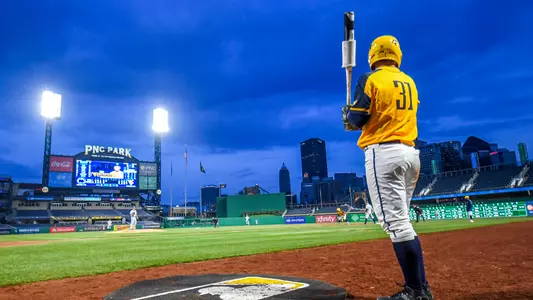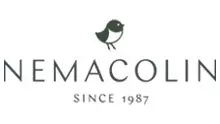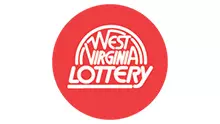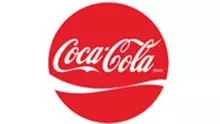
Photo by: All Pro Photography/Dale Sparks
Fans Now Enjoying Mountaineer-Panther Baseball Games, Too
May 13, 2019 03:33 PM | Baseball
MORGANTOWN, W.Va. – Looking for something fun to do on a Tuesday night? How about taking a drive up to Pittsburgh to catch a little college baseball action at PNC Park?
The nationally-ranked West Virginia Mountaineers will battle the Pitt Panthers for the 197th time since 1895, but it will be the first-ever brawl at the current home of the Pittsburgh Pirates.
The two teams once played at cavernous 59,000-seat Three Rivers Stadium, a 9-8 West Virginia victory in 1998 before lots and lots of empty seats, and games were also occasionally played at Forbes Field as well as old Exposition Park at the turn of the last century, but most of the meetings have taken place on the two campuses.
They played on and off from 1895 to 1924 until the series hit the pause button in 1925 after Pitt dropped baseball, an interruption that lasted 14 years.
The Backyard Brawl baseball revival in 1939 encompassed a May flurry of games that saw the two teams split four contests in Pittsburgh and Morgantown. In order to play on campus, the Panthers actually had to reconfigure Pitt Stadium into a makeshift diamond for the baseball team to use.
That season athletic director Jack Hagan arranged a 14-game baseball schedule, which represented one game for each year the program was dormant.
The Mountaineers and Panthers played four times again in 1940 and twice in 1941 and 1942 before the country drifted deeper into the war with Germany and Japan. World War II kept the Mountaineers from fielding baseball teams in 1943, 1944 and 1945, but when the team reassembled in 1946, the Pitt series resumed and continued uninterrupted until 1956.
Another disruption took place in 1967, and then more stoppages occurred in the early 1980s when Pitt left the Eastern 8 for the Big East and relations between the two schools turned frosty in all sports.
WVU and Pitt did not meet on the diamond in 1983, 1984, 1985, 1987 and 1989 before they finally settled on Hopwood, Pennsylvania, in 1990 as compromise location roughly halfway between Morgantown and Pittsburgh. Two games were played there in 1990 and 1991.
 The late Bobby Lewis, who coached the Panthers from 1955 to 1990, once recalled the spartan conditions the two baseball programs had to endure in the 1960s, 1970s and 1980s.
The late Bobby Lewis, who coached the Panthers from 1955 to 1990, once recalled the spartan conditions the two baseball programs had to endure in the 1960s, 1970s and 1980s.
"Coaching back then was really tough," he said shortly before his death in 1995. "I just wish some of the coaches who have the big budgets could experience what we had to go through.
"We didn't have dugouts. I remember playing at Hawley Field and that wind would kick up and get dust in your face. You would have to take timeout just to clear your eyes," he said.
The two schools resumed playing on each other's campuses in 1992, and they met continuously until a Big East scheduling quirk kept them from meeting in 2007. The conference had 11 baseball teams then, which meant there were not enough weeks in the spring for all of the teams to play each other.
Yet even when competing in the Big East, the schools' budgets remained miniscule compared to other more prominent college baseball programs.
West Virginia played at antiquated Hawley Field, which was actually a big step up from Pitt's Trees Field – a glorified high school facility with a couple rows of bleachers down each base line and a short leftfield fence that was more suitable for a game of whiffle ball.
The Panthers' lean baseball history is comprised of only three NCAA Tournament appearances, two coming under Lewis in 1959 and 1965, and the other occurring with Mark Jackson coaching the team in 1995.
Pitt's two most notable baseball alums are Major Leaguers Ken Macha and George "Doc" Medich.
After NCAA appearances in 1948 and 1955, West Virginia's postseason trips came in spasmodic fashion in the 1960s under Steve Harrick, and again in the 1980s and early 1990s under his protégé, Dale Ramsburg.
In all, WVU earned just 11 bids from 1948 to 1996.
"The only difference I could tell right away between Dale and Steve was that Dale was more liberal," Lewis once joked. "Dale used six baseballs in a game while Steve only used three. That was pretty much the only difference between the two."
In 2017, current coach Randy Mazey broke West Virginia's 21-year NCAA Tournament drought, and he's got a squad that should be in line for another bid later this month.
West Virginia (31-18) cracked the top 25 a month ago and currently sits at No. 19 in this week's Baseball America poll following last weekend's series win at Kansas State.
Mazey's Mountaineers are 7-5 against teams ranked in the top 25, and are an impressive 8-3 in weekend series play this season.
Pitt, too, is undergoing a baseball revival under former Florida State associate head coach Mike Bell. The Panthers finally have a suitable place to play at Charles L. Cost Field, and they are coming off an outstanding series win against 11th-ranked North Carolina last weekend.
Earlier this year, the Mountaineers needed a run in the bottom of the eighth inning to pull out an exciting 5-4 victory over Pitt at Monongalia County Ballpark before a record crowd of 3,487.
In fact, four of West Virginia's 12 largest home crowds have involved the Panthers. In 2015, 3,037 showed up at Mon County Ballpark to observe a 4-1 loss to the Panthers, and 2,815 watched West Virginia topple Pitt 2-0 in 2017.
 The final game the two teams played against each other at Hawley Field in 2013 had 2,535 in attendance – a Hawley Field record.
The final game the two teams played against each other at Hawley Field in 2013 had 2,535 in attendance – a Hawley Field record.
We could be in store for a crowd similar to that on Tuesday night in Pittsburgh if the weather cooperates.
"It's always a great game against Pitt; it's always a great time playing at PNC Park and when you put the two together it's going to be a lot of fun," Mazey predicted.
This will be the third straight year West Virginia has scheduled a game at PNC Park, the other two appearances coming against rival Penn State. A crowd of 2,474 attended the first game in 2017, a 4-2 Mountaineer victory, but last year's crowd barely exceeded 1,000.
Advanced tickets are on sale through the Pittsburgh Pirates official website, https://www.mlb.com/pirates/tickets/events/wvu-vs-pitt, and are priced at $10 for general admission. Pirates season ticket holders can purchase an advanced ticket for $7, as can WVU and Pitt faculty and alumni.
WVU and Pitt student tickets are priced at $2. The faculty/alumni and student ticket prices are for online orders using a special promo code provided on the Pirates website.
West Virginia holds a 108-88 all-time record in series play with Mazey owning a 9-3 mark against the Panthers.
WVU has won five straight and 10 out of the last 13 against Pitt.
First pitch is slated for 6 p.m. and the contest will also be available to watch on ESPN +.
The nationally-ranked West Virginia Mountaineers will battle the Pitt Panthers for the 197th time since 1895, but it will be the first-ever brawl at the current home of the Pittsburgh Pirates.
The two teams once played at cavernous 59,000-seat Three Rivers Stadium, a 9-8 West Virginia victory in 1998 before lots and lots of empty seats, and games were also occasionally played at Forbes Field as well as old Exposition Park at the turn of the last century, but most of the meetings have taken place on the two campuses.
They played on and off from 1895 to 1924 until the series hit the pause button in 1925 after Pitt dropped baseball, an interruption that lasted 14 years.
The Backyard Brawl baseball revival in 1939 encompassed a May flurry of games that saw the two teams split four contests in Pittsburgh and Morgantown. In order to play on campus, the Panthers actually had to reconfigure Pitt Stadium into a makeshift diamond for the baseball team to use.
That season athletic director Jack Hagan arranged a 14-game baseball schedule, which represented one game for each year the program was dormant.
The Mountaineers and Panthers played four times again in 1940 and twice in 1941 and 1942 before the country drifted deeper into the war with Germany and Japan. World War II kept the Mountaineers from fielding baseball teams in 1943, 1944 and 1945, but when the team reassembled in 1946, the Pitt series resumed and continued uninterrupted until 1956.
Another disruption took place in 1967, and then more stoppages occurred in the early 1980s when Pitt left the Eastern 8 for the Big East and relations between the two schools turned frosty in all sports.
WVU and Pitt did not meet on the diamond in 1983, 1984, 1985, 1987 and 1989 before they finally settled on Hopwood, Pennsylvania, in 1990 as compromise location roughly halfway between Morgantown and Pittsburgh. Two games were played there in 1990 and 1991.
 The late Bobby Lewis, who coached the Panthers from 1955 to 1990, once recalled the spartan conditions the two baseball programs had to endure in the 1960s, 1970s and 1980s.
The late Bobby Lewis, who coached the Panthers from 1955 to 1990, once recalled the spartan conditions the two baseball programs had to endure in the 1960s, 1970s and 1980s."Coaching back then was really tough," he said shortly before his death in 1995. "I just wish some of the coaches who have the big budgets could experience what we had to go through.
"We didn't have dugouts. I remember playing at Hawley Field and that wind would kick up and get dust in your face. You would have to take timeout just to clear your eyes," he said.
The two schools resumed playing on each other's campuses in 1992, and they met continuously until a Big East scheduling quirk kept them from meeting in 2007. The conference had 11 baseball teams then, which meant there were not enough weeks in the spring for all of the teams to play each other.
Yet even when competing in the Big East, the schools' budgets remained miniscule compared to other more prominent college baseball programs.
West Virginia played at antiquated Hawley Field, which was actually a big step up from Pitt's Trees Field – a glorified high school facility with a couple rows of bleachers down each base line and a short leftfield fence that was more suitable for a game of whiffle ball.
The Panthers' lean baseball history is comprised of only three NCAA Tournament appearances, two coming under Lewis in 1959 and 1965, and the other occurring with Mark Jackson coaching the team in 1995.
Pitt's two most notable baseball alums are Major Leaguers Ken Macha and George "Doc" Medich.
After NCAA appearances in 1948 and 1955, West Virginia's postseason trips came in spasmodic fashion in the 1960s under Steve Harrick, and again in the 1980s and early 1990s under his protégé, Dale Ramsburg.
In all, WVU earned just 11 bids from 1948 to 1996.
"The only difference I could tell right away between Dale and Steve was that Dale was more liberal," Lewis once joked. "Dale used six baseballs in a game while Steve only used three. That was pretty much the only difference between the two."
In 2017, current coach Randy Mazey broke West Virginia's 21-year NCAA Tournament drought, and he's got a squad that should be in line for another bid later this month.
West Virginia (31-18) cracked the top 25 a month ago and currently sits at No. 19 in this week's Baseball America poll following last weekend's series win at Kansas State.
Mazey's Mountaineers are 7-5 against teams ranked in the top 25, and are an impressive 8-3 in weekend series play this season.
Pitt, too, is undergoing a baseball revival under former Florida State associate head coach Mike Bell. The Panthers finally have a suitable place to play at Charles L. Cost Field, and they are coming off an outstanding series win against 11th-ranked North Carolina last weekend.
Earlier this year, the Mountaineers needed a run in the bottom of the eighth inning to pull out an exciting 5-4 victory over Pitt at Monongalia County Ballpark before a record crowd of 3,487.
In fact, four of West Virginia's 12 largest home crowds have involved the Panthers. In 2015, 3,037 showed up at Mon County Ballpark to observe a 4-1 loss to the Panthers, and 2,815 watched West Virginia topple Pitt 2-0 in 2017.
 The final game the two teams played against each other at Hawley Field in 2013 had 2,535 in attendance – a Hawley Field record.
The final game the two teams played against each other at Hawley Field in 2013 had 2,535 in attendance – a Hawley Field record.We could be in store for a crowd similar to that on Tuesday night in Pittsburgh if the weather cooperates.
"It's always a great game against Pitt; it's always a great time playing at PNC Park and when you put the two together it's going to be a lot of fun," Mazey predicted.
This will be the third straight year West Virginia has scheduled a game at PNC Park, the other two appearances coming against rival Penn State. A crowd of 2,474 attended the first game in 2017, a 4-2 Mountaineer victory, but last year's crowd barely exceeded 1,000.
Advanced tickets are on sale through the Pittsburgh Pirates official website, https://www.mlb.com/pirates/tickets/events/wvu-vs-pitt, and are priced at $10 for general admission. Pirates season ticket holders can purchase an advanced ticket for $7, as can WVU and Pitt faculty and alumni.
WVU and Pitt student tickets are priced at $2. The faculty/alumni and student ticket prices are for online orders using a special promo code provided on the Pirates website.
West Virginia holds a 108-88 all-time record in series play with Mazey owning a 9-3 mark against the Panthers.
WVU has won five straight and 10 out of the last 13 against Pitt.
First pitch is slated for 6 p.m. and the contest will also be available to watch on ESPN +.
Steve Sabins | Oct. 29
Wednesday, October 29
Kentucky TV Highlights (NCAA Clemson Regional Final) | June 1
Monday, June 02
Clemson TV Highlights (NCAA Clemson Regional) | May 31
Saturday, May 31
BSB: Clemson Regional Game 1 Recap (vs. Kentucky)
Saturday, May 31











